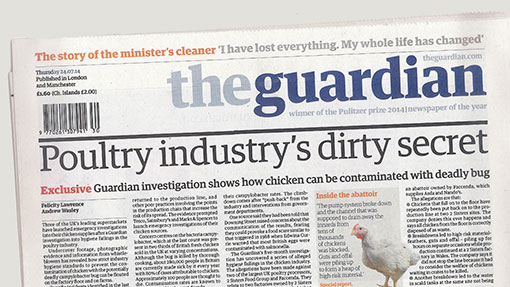Poultry processors deny newspaper accusations of dirty practice

Poultry processors have issued a stern defence of their company protocols, following allegations in The Guardian newspaper (24 July) of unhygienic practices and a lax approach to regulation.
In a feature article entitled “Poultry industry’s dirty secret”, the newspaper focuses on campylobacter levels throughout the poultry supply chain, claiming that malpractice on farms and in factories is contributing to a worsening disease situation.
The Guardian report uses undercover footage, photographs and whistleblower accounts of alleged poor practice at two leading processors – 2 Sisters Food Group and Faccenda Foods.
According to the newspaper, chicken carcasses that fell on the floor were replaced on the production line, breakdowns in the evisceration area led to intestines piling up, and dirty water in scald tanks was not changed frequently enough following another breakdown.
It also quotes a former poultry inspector as saying pressure from supermarkets had squeezed margins, which had allowed standards to slip.
But the two processors at the centre of the row have issued firm rebuttals .
2 Sisters Food group said the allegations about the business and the management’s approach to campylobacter were “untrue, misleading and inaccurate”. “There is no campylobacter contamination or problems at our sites, as confirmed by multiple independent external audits and our own rigorous testing. No risks to food safety have been raised at any time.”
On some of the specific allegations, 2 Sisters said all staff had been fully trained to ensure that any meat that hit the floor was disposed of as Category 2 and 3 waste. The online video footage was “inconclusive”.
It also explained that the issue with scald tanks “was an isolated event which lasted only one day” (not three, as claimed). The situation was assessed by the on-site vet and, with 10,000 birds held in lairage, it was decided it was best to keep the factory running.
A statement from Faccenda, which was accused by The Guardian of lax biosecurity controls on farms and at catching, also denied the allegations. “We have further improved biosecurity arrangements in place at all our farms, working to revised Red Tractor standards,” said managing director Andy Dawkins. “We also continue to invest in testing for routine surveillance as part of our risk assessment programme.”
Both processors highlighted their involvement in the pan-industry effort to contain campylobacter – with 2 Sisters investing £6m in various studies and Faccenda over £1m. Faccenda is set to introduce in-line carcass chilling later this year.
